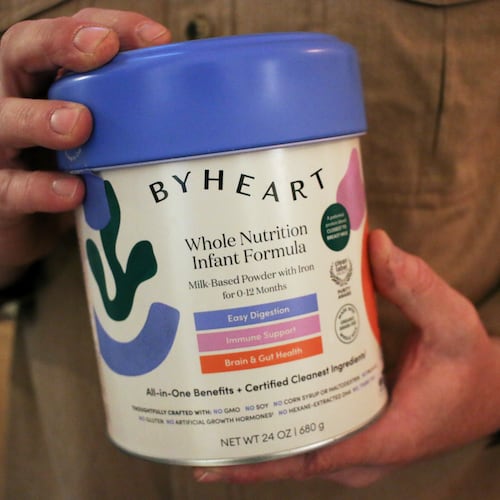U.S. food inspectors found “extremely high” levels of lead in cinnamon at a plant in Ecuador that made applesauce pouches tainted with the metal, the Food and Drug Administration said Monday. The recalled pouches have been linked to dozens of illnesses in U.S. kids., including a dozen cases in Georgia.
Cinnamon tested from the plant had lead levels more than 2,000 times higher than the maximum level proposed by the FDA, officials said.
The FDA continues to investigate how the cinnamon was contaminated. Jim Jones, who heads the agency’s human foods program, said in an interview with Politico last week that the lead contamination appeared to be “an intentional act.”
One theory is that the cinnamon may have been contaminated for economic reasons, agency officials said. That could mean an ingredient is added or subtracted from a food to to boost its value. For example, compounds like red brick, red lead salt, lead oxide and lead chromate, which mirror cinnamon’s red color, have been added to increase the value of the spice by adding color and weight, research shows.
The samples came from ground or powdered cinnamon from Negasmart, an Ecuadorian company that supplied the spice to Austrofoods, which made the pouches.
The applesauce pouches were sold under three brands — WanaBana, Schnucks and Weis. Officials with Austrofoods did not respond to requests for comment about the investigation.
FDA said lead has not been detected in WanaBana products made without cinnamon and sold in the U.S.
At least 205 children from 33 states may have been sickened by lead poisoning since late October, according to the latest information available by the Centers for Disease Control and Prevention. Using a different reporting method, the Food and Drug Administration counts at least 65 kids ages 6 and younger sickened in 27 states as of Dec. 8.
In Georgia, the total has risen to 12 cases, according to the most recent data available from the Georgia Department of Public Health. DPH spokeswoman Nancy Nydam told The Atlanta Journal-Constitution that the cases of lead poisoning include eight confirmed cases, three probable, and one suspected case. Cases can be confirmed when a person has an elevated blood level within three months after consuming a recalled product.
Cases of lead poisoning classified as “probable” include those where people show elevated blood levels within three months of eating one of the recalled applesauce pouches, but either an environmental assessment was not completed or it was performed and the results indicated other potential sources for lead exposure.
Nydam said the Georgia agency sent lead inspectors to do home inspections for the lead poisoning cases here. Soil and paint tests are needed to rule out other potential sources before a case can be confirmed.
Georgia health officials haven’t shared any more details on the children sickened in Georgia including where they live, their ages or blood lead levels.
There’s no safe level of lead exposure, and lead is particularly dangerous to children because their growing bodies absorb more lead than adults and their brains and nervous systems are more sensitive to the damaging effects of lead.
Tests show children who ate the pouches had blood lead readings up to eight times higher than the reference level that sparks concern, health officials said. Samples of the apple puree showed lead contamination more than 200 times higher than the FDA allows, officials said.
FDA officials said they “cannot take direct action” with Negasmart and are relying on officials in Ecuador for the investigation into the company’s actions. Negasmart does not ship product directly to the U.S. and of Negasmart’s customers, only Austrofoods shipped foods to the U.S., the agency said.
The reported symptoms according to the CDC has included headache, nausea, vomiting, diarrhea, a change in activity level and anemia. But the CDC said most children with any lead in their blood have no obvious immediate symptoms. Dr. Hugo Scornik, a local pediatrician and former president of the Georgia chapter of the American Academy of Pediatrics, said if a child ate one of the recalled products, they should contact their pediatrician for a blood test.
The CDC said most local health departments can also test for lead in the blood. Many private insurance policies cover the cost of testing for lead in the blood, according to the CDC. The cost of blood lead testing for children enrolled in Medicaid is covered by the Centers for Medicare & Medicaid services.
AstroFood, said Monday it will reimburse customers up to $150 for lead tests.
There is no medicine that reverses the harm that has already occurred from lead poisoning. A chemical process called chelation therapy helps remove heavy metals like lead from the blood, but the therapy has serious side effects that could potentially be life-threatening. Doctors only use chelation for very high blood lead levels.
The Associated Press contributed to this article. The Associated Press Health and Science Department receives support from the Howard Hughes Medical Institute’s Science and Educational Media Group. The AP is solely responsible for all content.
About the Author
Keep Reading
The Latest
Featured



